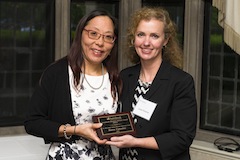Q and A with an Education Champion: Dr. Sharon Yamashita
Dr. Sharon Yamashita started working at Sunnybrook in 1985 – first as a pharmacy resident and then as a staff pharmacist. After working for two years, she decided to go back to school to pursue further opportunities in teaching and research. After completing a Doctor of Pharmacy degree (at the State University of New York in Buffalo, as there were no Canadian programs at that time!), Dr. Yamashita returned to Sunnybrook as a Clinical Coordinator/Professional Practice Leader. Since that time she has been acting as the liaison pharmacist to the Critical Care Unit and the clinical coordinator for the pharmacists working with the surgical/trauma services. In addition, she has also been active at the University of Toronto, teaching courses at the Faculty of Pharmacy as well as precepting students on rotation at Sunnybrook.
Dr. Yamashita recently received the Allan Knight Lifetime Achievement in Teaching Award. We caught up with Dr. Yamashita to learn more about what makes her an education champion.
1. What do you like the most about teaching?
I love sharing knowledge. I also enjoy trying to simplify complex material and concepts into information that is applicable and easy to remember. It is very gratifying to see the expression on students’ faces when they finally “get it”.
2. How does it feel to receive an award for your work as an educator?
It is a real honour to receive an award for something that I enjoy doing, particularly in an institution that is filled with excellent clinicians and educators. I was also really touched by all of the work that my colleagues did in putting the nomination package together, as well as the past students and many colleagues who wrote letters in support of the nomination.
3. What advice do you have for other educators, preceptors or mentors at Sunnybrook and beyond?
You need to be flexible: flexible in your teaching style, flexible towards the different learning styles of students, flexible to changes in clinical knowledge as well in the hospital/academic environment.
4. What's one thing you have learned through your role as a teacher?
I have learned that it is much easier to teach content than it is to teach a process for problem solving or clinical decision-making. I warn students that I tend to ask a lot of questions, sometimes in quick succession. I explain that I am not intending to intimidate the students but instead I am trying to show them what I am thinking and how I am making clinical decisions.






